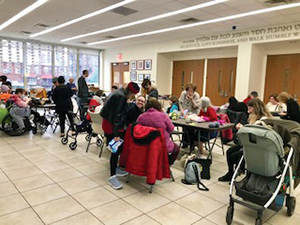
After October 7, Riverdalian Nancy Stern Scholem learned that Tanya Singer from Tablet magazine had organized a group of people to knit black caps for the soldiers in Israel. The caps were to be worn under their helmets and had to be uniform with a specific pattern approved by the IDF.
Stern Scholem decided to create a knitting group in her own shul, the Hebrew Institute of Riverdale—The Bayit. She first had to raise money for the yarn. By fundraising and selling dog tags for the hostages, she managed to raise some capital. Stern Scholem’s friend Fern Penn called David Blumenthal, the owner of Lion Brand yarn, and asked him to contribute. Since that call, Blumenthal has contributed generously, sending cartons of yarn on a continual basis.
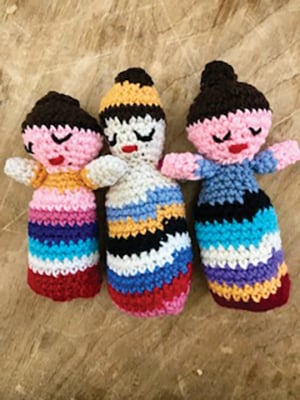
Penn, who lives in Manhattan, is a member of the Hebrew Institute of Riverdale—The Bayit. Though she doesn’t travel on Shabbat, she attends many of the shul’s weekday events. “Even though I’m not a great knitter, I can crochet a bit. When I heard about this, I said ‘I’m in.’ I assigned myself the job of bringing snacks for everyone—knit and nosh. I bring Israeli snack food: Bissli, Bamba, halvah, wafer crackers, chocolates—whatever I can find that was made in Israel.”
“It’s all grassroots,” explained Stern Scholem. “At the Bayit, we sent out the word that we need knitters, and we have been knitting since the end of October. We have, to date, made hundreds and hundreds of hats for the soldiers.”
Another group member, Ellie Weinstein, who lives in Riverdale part-time and in upstate New York part-time, has spread the word upstate. People bring items to her when she is in the country and she brings them down. “I have told women in Florida and they send me hats. People from Woodstock, Albany and Schenectady have somehow heard and have sent hats or yarn.”
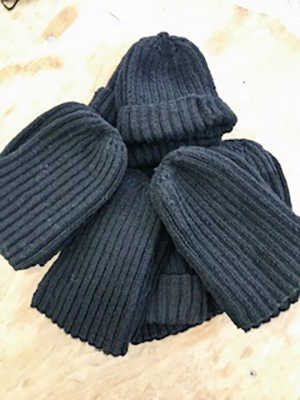
Rabbi Heshie Billet, the father-in-law of the Hebrew Institute of Riverdale’s rabbi, Rabbi Steven Exler, came to speak at the Bayit one day. He mentioned that his grandson was in a tank unit of 80 soldiers and they were freezing. “So we made 80 hats,” said Stern Scholem. “We started with 15, then 30, then 55, and made it to 80. We sent notes in each hat with messages such as: ‘This hat was made with love and prayers for your safety,’ or ‘Come home safe.’”
Right after that, Stern Scholem learned that someone was raising money for helmets for a unit of 35 soldiers. “I said, ‘I can’t pay for 35 helmets, but I will make sure that each soldier gets a hat.’”
Weeks into making the hats, Stern Scholem heard about young Israeli widows who were pregnant. She saw a photo of 15 babies born to families of Kibbutz Nir Am, a community that was attacked by Hamas on October 7. The idea came to her to crochet and knit baby blankets. The group worked hard on their new project, and sent around 50 baby blankets to Israel. “We can give money, and we should, but this feels more hands-on. A baby is being wrapped in a blanket that we knitted. Those babies are our babies, too! Can you imagine if one of these babies keeps their blanket and says one day, ‘My mother survived and I was born and someone in America cared enough to make sure I was warm!’”
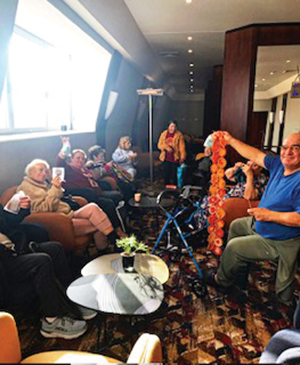
Stern Scholem then started thinking about the people displaced from their homes. Penn came up with the idea to make crocheted necklaces for displaced women. The group made 100 necklaces before Penn took them to Israel and personally delivered them to the evacuees in hotels in Tel Aviv and Jerusalem. The group then segued into hair coverings of various types (caps, turbans, headbands) to be given out at the mikvahs, as well as “worry dolls” for displaced children.
“I open my front door in the morning and sometimes there’s a shopping bag with a baby blanket, or a bag of yarn,” says Stern Scholem. “People from Florida and across the country have heard about this and gotten my address and sent me things,” she shared.
Stern Scholem currently has 80 women on her email list of knitters. While most of the knitting is done at home, many of the group members meet once a month at the Hebrew Institute of Riverdale—The Bayit. The crowd usually consists of 30-40 people. “The doors open up and the women come. Some come in wheelchairs with their aides, and the aides knit too! Everyone talks, and incredible friendships have developed from this.”
“People come who don’t belong to the synagogue,” added Penn. “Everyone is welcome. Rav Steven and Rabbanit Bracha come down and say hello to each and every person there. There are often 35 people there, and they talk to everybody.”
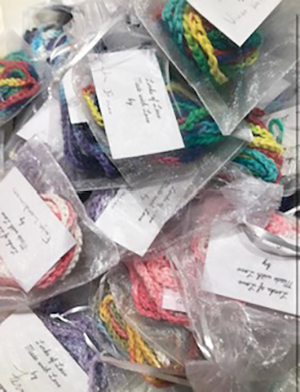
Rabbi Exler said: “The dream of this Bayit is that it welcomes people of all backgrounds to come together, to form community, and to do things of meaning for the Jewish people and for the world. One incredible expression of these values is our Bayit Knitting Volunteers group. I am so incredibly grateful to each and every knitter. Whenever I walk into the main lobby where the volunteers meet, the space is filled with friendships being formed and kindness being done. It is uplifting and inspiring.”
Stern Scholem concluded: “It’s a wonderful thing when people don’t disappoint. Everyone has stepped up—with either yarn or money, or their time. There are so many ways to contribute, and it’s very personal. Among our members is a new mother who brings her baby to our meetings. So, our youngest member is less than 1 year old, and our oldest member is 97. It’s an age-buster. It crosses many boundaries. If you’re an aide, if you’re 25 or 95, it doesn’t matter. We’ve got everyone up and running. It takes a village, and we have created a village.”









